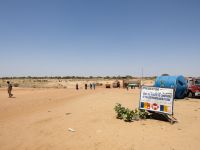With every major world event, we mostly wonder if that certain event is going to trigger an economic crisis. With every economic crisis, we often wonder how long its damage is going to last.. and to find answers to these questions, we often go back to history.
History of market pullbacks since the Financial Crisis https://t.co/t7WGjMh70j pic.twitter.com/dSWDIR7Y9a
— Trevor Noren (@trevornoren) July 15, 2020
No one likes economic crises. Nothing about them is fair even when we expect them to "impose a certain level of equality," they bring nothing but distress, loss, frustration, and even political unrest.
Even though economists have been studying all aspects of financial meltdowns for at least two centuries, humanity can not yet get a grip on ways that can stop these shocks from taking place.
In our lifetime, most of us have lived through two or three global economic depressions, including the ongoing one which was triggered by the COVID-19 pandemic in the early months of 2020.
Besides the pandemic's global financial calamity, Lebanon has been living through one of the 21st century's worst economic recessions in the country's history. According to the World Bank, the crisis that began in October 2019 "could rank as one of the three most severe the world has seen since the mid-19th century."
In this article, we will go further back in history in an attempt to learn more about older economic slumps across the world.
1. The 1866 Panic
It was the collapse of the London-based Overend, Gurney, and Company bank that prompted a whole international financial crisis, given the UK's global lead at that time. The crisis was the climax of several periods of financial distress, ones that were termed as "panics" before the actual collapse of the major monetary institution.
This had been the worst financial meltdown for the UK until the 2008 shock.
2. The Wall Street Crash - 1929
Who doesn't know the Great Depression that started in New York's Wall Street before its effect plagued world markets in no time? This crisis lasted for 10 years and is still considered the single most severe financial crisis in modern history.
#History #fullcircle #greatdepression
— Mark Wittenberg #CES2021 (@itsmwittenberg) May 30, 2021
In all, 9,000 banks failed during the decade of the 30s. It's estimated that 4,000 banks failed during the one year of 1933 alone. By 1933, depositors saw $140 billion disappear through bank failures. pic.twitter.com/B9MvRDOazm
The depression resulted in massive deflation rates, high unemployment, and steep declines in industrial productions, in addition to spikes in poverty and homelessness rates.
3. 1973 Oil Crisis
The crisis began at the same time a full-scale war erupted between Egypt and Syria on one hand and Israel on the other.
How the world can be influenced by oil corporations. This is 1973. Led to the Oil Shock.#auspol #UniteBlue pic.twitter.com/dkuoGwmLIZ
— Resistance✊ (@deanhepburn) December 29, 2013
In an attempt to support the Egyptian and Syrian military and political stance during the war, oil-producing Arab states decided to impose an oil embargo on Western countries that supported Israel financially, including the United States, Canada, Japan, the Netherlands, and the United Kingdom.
The embargo which had lasted between October 1973 to March 1974 had resulted in long-term historic rises in oil prices worldwide.
4. 1970s Latin American Debt Crisis
This major financial crisis is the reason Latin American countries often refer to the 1970s as the Lost Decade.
The aspirations of Brazil, Argentina, and Mexico of boosting their industrial potential in the early 1970s had inspired all three countries to borrow large sums of money from the World Bank and other international monetary bodies, which were all meant for investments in local economies.
However, borrowing against oil futures had troubled their economies amid the rise of oil prices during the 1970s, leaving these countries in huge debts that have been considered as the most serious in the continent's history.
5. 1991 Indian Crisis
It was due to more than a decade of poor economic policies that the Indian economy suffered a deep meltdown during the first years of the 1990s, one that had urged international financiers including the World Bank and the IMF to stop their assistance programs to the country.
The crisis ended with the liberation of the Indian economy and the government's decision to airlift its national gold reserves.
6. 1997 Asian Crisis
The crisis began in Thailand where the local currency was floated to support the currency's peg to the U.S. dollar. However, the financial calamity quickly spread over to other parts of east and southeast Asia, particularly Indonesia and South Korea.
7. 1998 Argentina's Great Depression
The economic crisis hit the country between 1998 and 2002, affected by the Russian and Brazilian financial crises. The crisis had caused extremely high levels of unemployment that led to nationwide riots.
According to several sources, the crisis had caused more than 50% of Argentines to live below the official poverty line while 25% couldn't have their needs met on a regular basis.
8. 2008 Crash
This was the 21st century's first global economic crisis. Starting in the US with a housing bubble that caused several banks to go bankrupt, the crisis quickly infected every country around the world, causing major meltdowns everywhere around the world and leaving millions of people unemployed for years.
First frame the Financial Crisis of 2008 how worse it was.
— NØTØRÏØÜS☠️ (@Abu_khalipha) May 27, 2021
Second frame the Corona Crash being the worse ever market drop by pip value pic.twitter.com/Tse6sDuwR8
9. 2008 Spanish Crisis
The crisis lasted for 6 years and was mostly known as the "Great Spanish Recession." Similar to the 2008 global crash, this meltdown was caused by a housing bubble across Spain, one that was made worse by banks that had hidden the actual figures from the public and the experts, misleading the real estate market until it exploded in 2008.
10. 2009 Greek Crisis
The Greece economy too was hardly impacted by the global crisis of 2008, where the lack of confidence in the local economy combined with lack of flexibility in terms of economic policies resulted in extremely high government debt, one that reportedly reached about $299.7bn and smashing the country's GDP.
Which of these crises do you think had the biggest impact on today's world? How many crises have you lived through?









